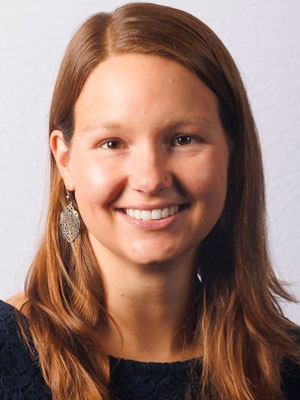Meet our new faculty: Carly Hyland

- Discipline: Environmental Health Sciences
- Research interests: Community-based research to minimize the impacts of climate change among agricultural and food systems workers
- Hometown: Marshfield, WI
- Current City: Boise, ID
- Hobbies: Triathlon, hiking, spending time with my dog Rocco
In July 2023, Berkeley Public Health and UC Cooperative Extension welcomed new assistant professor of Environmental Health Sciences Carly Hyland. Dr. Hyland received her PhD in Environmental Health Sciences from UC Berkeley School of Public Health in 2021 and her MS in Global Health and the Environment from UC Berkeley in 2017. We asked her about her work and hopes for the semester.
Berkeley Public Health: Where did you live and work before joining the UC Berkeley School of Public Health?
Carly Hyland: I attended UC Berkeley School of Public Health for my master’s from 2015–2017 and for my PhD from 2018–2021. I did a postdoctoral fellowship at the School of Public and Population Health at Boise State University in Boise, Idaho, from 2021–2023.
What drew you to work and teach at UC Berkeley? Are there any researchers here who you really wanted to work with?
There are so many reasons I wanted to come back to Berkeley, and I think one of the biggest motivating factors for me was the collaborative environment focused not just on conducting innovative research, but also translating those findings into solutions to improve community health. Farmworkers are increasingly experiencing the health impacts of climate change on a daily basis, and this position will provide me with the resources and collaborations necessary to identify strategies to address these urgent issues. I am looking forward to working with new and previous collaborators, including Dr. Carisa Harris-Adamson and Dr. Kim Harley.
What are you currently working on?
I recently finished a mixed-methods project examining pesticide exposure and perceptions of the risks of pesticides among men and women Latinx farmworkers in Idaho. We found that men and women had similar concentrations of biomarkers representing exposure to various pesticides, but women were more likely to report having experienced an Acute Pesticide Poisoning. Further, data from semi-structured interviews suggest that farmworkers may have limited control over circumstances that impact pesticide exposure, and that upstream factors (e.g., employer provisioning of protective equipment, availability of handwashing stations in the fields) are critical determinants of farmworkers’ adoption of behaviors that have been associated with lower pesticide concentrations. Participants also reported concerns about extreme heat and altering behaviors that are important for pesticide protection, such as wearing less protective equipment.
I am pursuing projects in California examining interventions to protect farmworkers from pesticides, extreme heat, and wildfire smoke in collaboration with community partners.
What are your hopes going into the fall semester?
My main goals in the Fall semester are to develop relationships with community partners working in climate change and farmworker health, establish collaborations with new colleagues at Berkeley, and enjoy being back in the Bay!